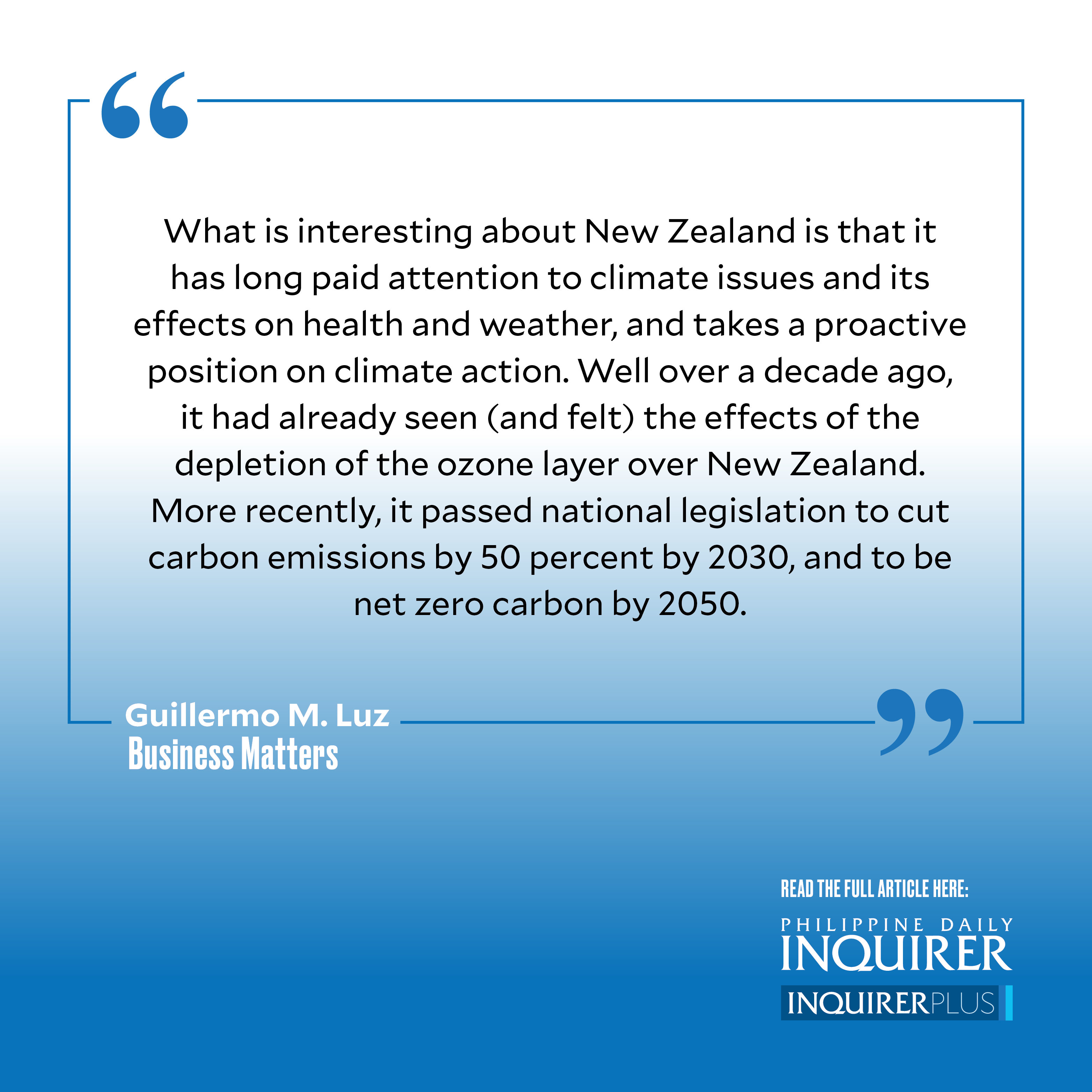Living in a climate-defined world

I am writing this column from New Zealand after the close of this year’s first meeting of the Apec Business Advisory Council (Abac). One of the areas of concern, among many on our agenda for the last few years, is climate change. Now, New Zealand is not a place one would automatically associate with the impacts of climate change. Yet three weeks ago, and then again last weekend, New Zealand had experienced the effects of climate change firsthand. Three weeks ago, Auckland experienced three months’ rainfall in roughly four hours. The extremely heavy rainfall caused floods in Auckland, which is not the kind of place which experiences floods in the same we do in Manila. The airport flooded inside the terminal, and domestic and international flights were canceled for over a day.
Last weekend, as I was en route to Auckland for the Abac meeting, so was Cyclone Gabrielle. It had formed somewhere over the Coral Sea and was heading toward the eastern seaboard of the North Island. New Zealand’s meteorological service, the airlines, and even our meeting organizers kept us regularly informed of the storm’s progress; once our flight landed, emergency messages and distress signals were all texted to us on every phone, which was turned on inside the plane. Citizens were advised to stay home and avoid unnecessary trips. Sandbags were provided by the government for the protection of buildings and homes as weather forecasters projected up to 300 millimeters of rainfall (about 12 inches) over the next 72 hours. Again, the airport was closed to domestic and international traffic for over a day. Those of us from Southeast Asia attending the meeting were frankly quite surprised at the level of preparation and warnings we received for what appeared to be an “ordinary” storm by our standards. But in a place not used to strong storms in relatively quick succession, it was quite understandable.
What is interesting about New Zealand is that it has long paid attention to climate issues and its effects on health and weather, and takes a proactive position on climate action. Well over a decade ago, it had already seen (and felt) the effects of the depletion of the ozone layer over New Zealand. More recently, it passed national legislation to cut carbon emissions by 50 percent by 2030, and to be net zero carbon by 2050. That’s a pretty tall order for most companies; that’s an altogether daunting challenge for an entire country. If any country stands a chance of doing it, I imagine New Zealand has a better chance than most.
Over this last week, I’ve had a chance to learn about three separate projects, which address environmental challenges. At our Abac meeting, meals were made from sustainably or organically grown ingredients, including net zero carbon lamb rack and beef. Naturally, I was curious how one raises net zero carbon livestock. Initially, I thought that growers might be buying carbon credits. However, it turned out that inspectors were auditing farms’ vegetation cover to measure their level of carbon capture and benchmarking that against the number of livestock being raised.
In another example, a food technology incubator worked with food innovation startups to maximize value out of food products, including their byproducts which were typically thrown away as waste. After using the edible parts of an agricultural or marine product, companies focused their attention on byproducts such as marine shells, fruit rind, and coffee grounds to extract proteins and compounds, which could be used for nutraceuticals or “cosmeceuticals.” The objective was to reduce waste, extract the maximum value added, and create entirely new products.
Finally, I had the chance to catch up with a former staff of ours at the Philippine Disaster Resilience Foundation, who now works at a climate action and innovation hub for the Auckland City Council. With the new legislation in place for net zero carbon by 2050, her job is to look for climate action solutions not only for the city but to also offer advice and mentoring to small- and medium-scale companies to help them get to net zero carbon.
When I first started the Liveable Cities Challenge project several years ago, we used to say we are entering a climate-defined future. That is no longer the case. Today, we already live in a climate-defined world.
—————–
Guillermo M. Luz is chief resilience officer of the Philippine Disaster Resilience Foundation and chair of Liveable Cities Philippines.
—————–
Business Matters is a project of the Makati Business Club (makatibusinessclub@mbc.com.ph).




















